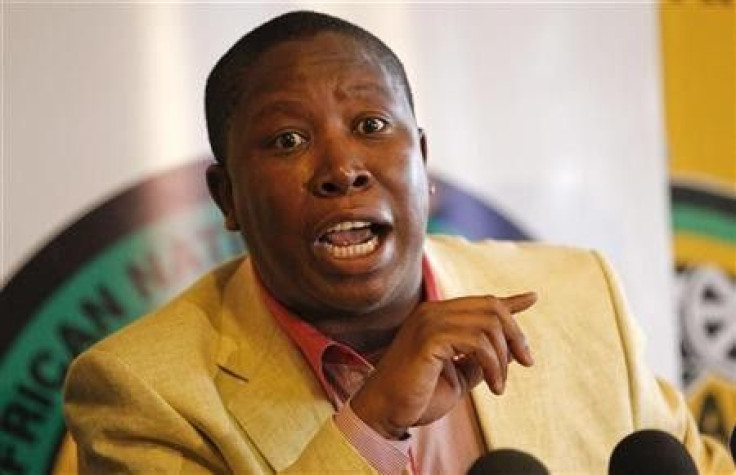Do Julius Malema’s Leftist Ideas Stand A Chance In ANC-Ruled South Africa?

A South African court has placed Julius Malema under “provisional sequestration” because of years of unpaid taxes, but he is vowing to fight a punishment that could bar him from parliament.
The decision by the Pretoria High Court on Monday, which will be made final May 26 unless a court reverses it, was a near miss for the leftist politician, whose outspoken ideas have alienated him from some groups but endeared him to others. Had the ruling been a “full” sequestration, he would be barred from participating in parliament even if his party won enough votes May 7.
Under South African law, a sequestration prevents a person from serving in parliament until they are rehabilitated.
The Economic Freedom Fighters, a political group he founded after his expulsion from the African National Congress (ANC) party in 2012, claims that the South African Revenue Service (SARS) was trying to prevent Malema from running. Official reports cite that he had owed nearly $1.45 million (16 million rand) of unpaid tax returns.
“The sequestration by SARS remains part of a continuous onslaught to silence the agenda of economic freedom in our lifetime,” reads an EFF press release.
It’s not an unusual stance for the left-leaning party, which advocates for a variety of socialist economic policies – many of which are controversial.
“The first decision I make as president would be the redistribution of land back to the people,” Malema said at an event on Sunday, according to News24, referring to his plan to reclaim white-owned land for the government to use for public benefit, without payment to the owners.
He also supports the nationalization of the country’s mines and banks.
Though investors, critics and economists shun many of his ideas, they’re popular with some South Africans who feel that the ruling ANC has not lived up to its economic goals since it was first elected in 1994.
“We’re voting for Malema because he can help us,” said one man in Hebron, a small township where protesters riot against unemployment and poverty, to Reuters.
In 2008, Malema was elected the president of the ANC Youth League and moved up within the party until 2012 – when he was expelled after years of outspoken comments and accusations of hate speech that didn’t comply with the party line.
Now, he publicly opposes current President Jacob Zuma, who has been criticized by others for allegedly misusing government funds, and failing to help pull millions of South Africans out of poverty since the ANC came to power two decades ago.
Malema's rebellious past and recent run-in with SARS would seem to take him out of the presidential race, but his experience does come with a few benefits. When he was with the ANC, he helped the party get Zuma out of a similar legal predicament to gain the presidency.
“His advantage is the fact that he’s been in this game before, thanks to his battle to save Zuma’s skin,” reads an editorial in the Johannesburg-based paper The Citizen. The article is entitled “It’s too early to write off Malema.”
© Copyright IBTimes 2024. All rights reserved.












